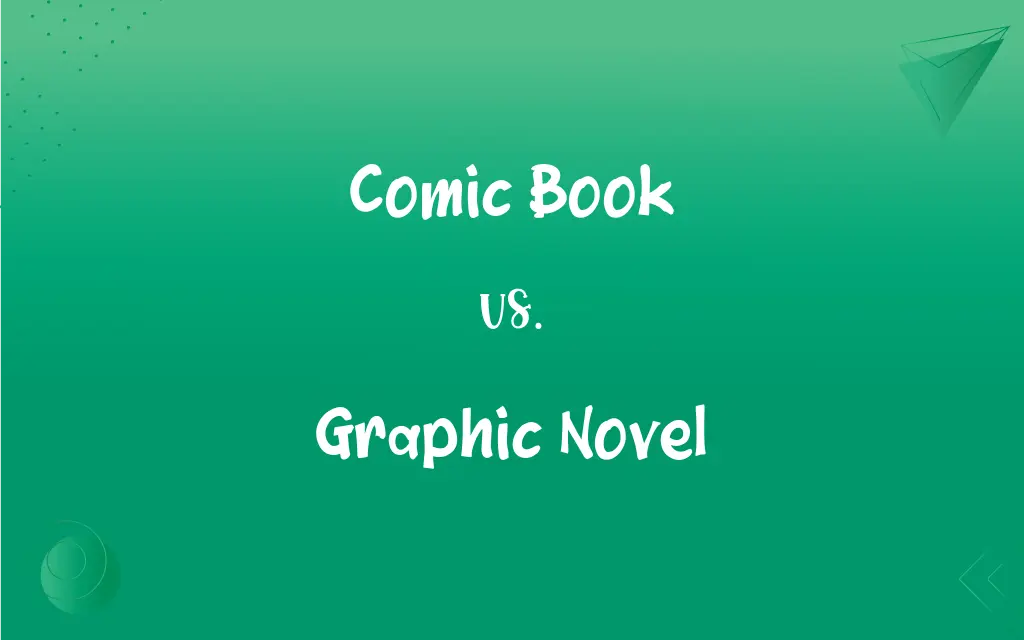Comic Book vs. Graphic Novel: What's the Difference?
Edited by Aimie Carlson || By Janet White || Published on November 3, 2023
Comic Book; A serialized narrative in illustrated panels. Graphic Novel; A longer, more complex, standalone story in comic form.

Key Differences
Comic Book typically refers to serialized, shorter narratives presented in a magazine-style format, often featuring recurring characters and cliffhangers. Graphic Novel, on the other hand, is usually a longer, standalone work with a self-contained story, resembling a novel in scope and depth.
The content of a Comic Book is generally released in episodic installments, leading to ongoing story arcs. In contrast, a Graphic Novel offers a single, cohesive narrative, similar to a traditional novel but told through sequential art.
In terms of production, Comic Books are often part of a series and are published monthly or bi-monthly. Graphic Novels are published as complete works, and their production often mirrors that of books.
The target audience for Comic Books can range widely but traditionally caters to younger readers or fans of specific genres. Graphic Novels, however, often tackle more mature themes and are aimed at a broader audience, including adult readers.
Comic Books are known for their iconic characters and legacy in popular culture, with many being part of larger fictional universes. Graphic Novels are recognized for their artistic and narrative sophistication, often being standalone stories with unique themes.
ADVERTISEMENT
Comparison Chart
Length
Shorter, episodic
Longer, complete narrative
Format
Serialized, magazine-style
Book-like, standalone
Publishing
Periodic (monthly, bi-monthly)
Published as a complete work
Content
Often genre-specific, recurring characters
Diverse themes, self-contained
Target Audience
Broad, often younger readers
Broader, including adults
ADVERTISEMENT
Comic Book and Graphic Novel Definitions
Comic Book
Comic Books are often published periodically.
“The latest comic book in the series comes out next week.”
Graphic Novel
A Graphic Novel is a standalone narrative told through sequential art.
“The graphic novel provided a complete and satisfying story.”
Comic Book
Comic Books are serialized narratives with illustrations.
“I eagerly await the next issue of my favorite comic book every month.”
Graphic Novel
Graphic Novels explore a wide range of themes and subjects.
“Her graphic novel collection includes works on history, fantasy, and real-life issues.”
Comic Book
Comic Books are a popular form of entertainment and storytelling.
“Comic books have been a significant part of pop culture for decades.”
Graphic Novel
Graphic Novels are longer than typical comic books.
“I spent the weekend immersed in a compelling graphic novel.”
Comic Book
Comic Books cover a range of genres from superheroes to science fiction.
“Her comic book collection spans from horror to fantasy genres.”
Graphic Novel
Graphic Novels combine art and literature to tell complex stories.
“The graphic novel’s artwork added depth to its intricate storyline.”
Comic Book
A Comic Book uses panels of artwork to depict a story.
“The artist’s skillful use of panels in the comic book brought the story to life.”
Graphic Novel
Graphic Novels are published as complete works, resembling books.
“The newly released graphic novel added weight to my bookshelf.”
FAQs
What is a Comic Book?
A Comic Book is a serialized narrative told through illustrations and panels.
Are Comic Books only about superheroes?
No, Comic Books cover various genres, though superheroes are popular.
Can Graphic Novels be for adults?
Yes, Graphic Novels often target a broad audience, including adults.
Are Graphic Novels considered literature?
Yes, Graphic Novels are often recognized for their literary and artistic value.
Can a Comic Book become a Graphic Novel?
Sometimes, serialized Comic Books are compiled into a Graphic Novel format.
What defines a Graphic Novel?
A Graphic Novel is a longer, standalone story told through sequential art, similar to a novel.
Are Comic Books less sophisticated than Graphic Novels?
Not necessarily. Both forms have their unique storytelling methods and complexities.
Do Graphic Novels always have complex stories?
Often, but not always. Some can be straightforward but are just told in a longer format.
How often are Comic Books published?
Comic Books are typically published monthly or bi-monthly.
Do Graphic Novels have sequels?
While some may have sequels, Graphic Novels are generally standalone stories.
Can a Graphic Novel be part of a series?
Yes, but each Graphic Novel in the series usually presents a complete narrative.
Do Comic Books have ongoing storylines?
Yes, many Comic Books have ongoing storylines across multiple issues.
Can Graphic Novels be non-fiction?
Yes, Graphic Novels can cover non-fiction topics as well.
Is it easier to read Comic Books than Graphic Novels?
This depends on the reader’s preference; Comic Books are shorter, while Graphic Novels are more detailed.
Are Comic Books considered collectibles?
Yes, many Comic Books, especially vintage ones, are considered collectibles.
Do Comic Books always have colorful illustrations?
While common, some Comic Books use monochrome or limited color palettes.
Are Comic Books only for children?
No, Comic Books cater to a wide range of age groups, including adults.
Do Graphic Novels have chapters?
Some do, similar to chapters in traditional novels.
Can someone who likes Comic Books enjoy Graphic Novels?
Absolutely, many fans appreciate both forms for their storytelling and art.
Are Graphic Novels more expensive than Comic Books?
Generally, yes, due to their length and often higher production quality.
About Author
Written by
Janet WhiteJanet White has been an esteemed writer and blogger for Difference Wiki. Holding a Master's degree in Science and Medical Journalism from the prestigious Boston University, she has consistently demonstrated her expertise and passion for her field. When she's not immersed in her work, Janet relishes her time exercising, delving into a good book, and cherishing moments with friends and family.
Edited by
Aimie CarlsonAimie Carlson, holding a master's degree in English literature, is a fervent English language enthusiast. She lends her writing talents to Difference Wiki, a prominent website that specializes in comparisons, offering readers insightful analyses that both captivate and inform.






































































